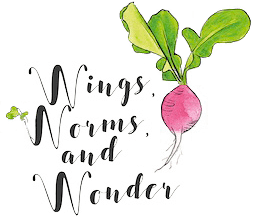Wonder Wednesday 118: Growing Gifts
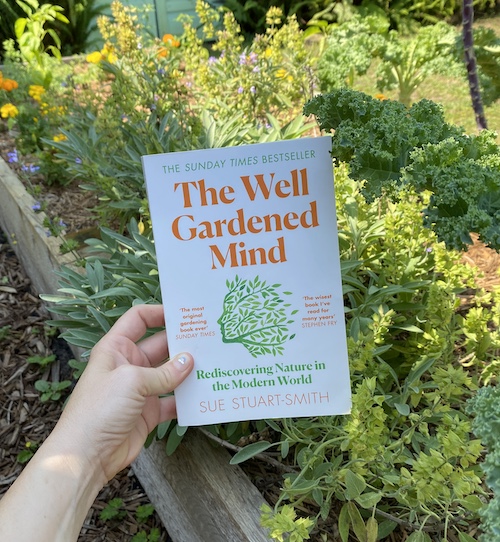
Nurturing Life
Just as the necrosphere provides the nutrients that help life thrive, how does the act of nurturing growth help us thrive in life?
These are the types of question circles that spin through the interlocking web of life in my mind these days.
So far, the book The Well Gardened Mind is winning at helping remind me of why, in a culture that seems hell bent on destroying itself and the natural world that supports it, to even bother at all.
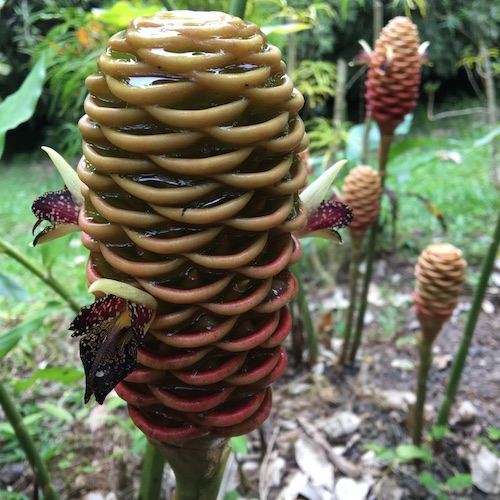
Seemingly bleak outlook, I know, especially for someone who seems pretty cheery most of the time. But if you've been around here a while you know I value the beauty of embracing melancholy. It's part of being an artist, I guess.
The less chipper sides of life, the necrosphere, and the sadness are not states to avoid or repress. Feel them, experience them, value the lessons they teach, but don't get stuck in them. Let them pass through like a storm rolling by. Ride the waves rather than let them hold you down.
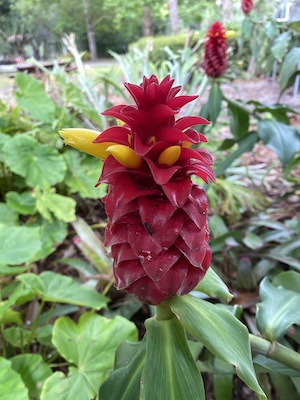
Immerse in Growth:
In the book the Well Gardened Mind, by psychiatrist Sue Stuart-Smith, she reveals the emotional intelligence, psychological benefits, and the groundbreaking neuroscience behind why gardening and nurturing plants is so extremely healing and beneficial for humans.
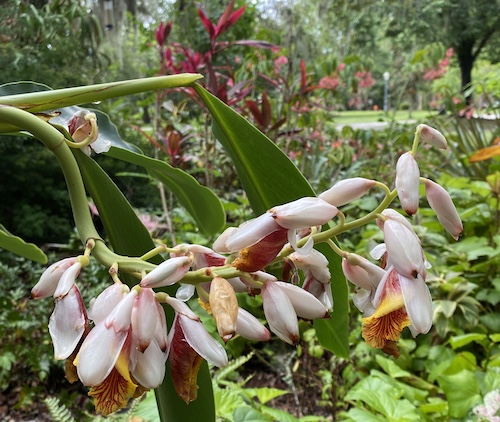
It not only builds creativity while calming the nervous system, but gardening "encompasses the emotional, physical, social, vocational and spiritual aspects of life " (41). A Danish study even produced results that showed 10 weeks of horticulture therapy provided a very similar level of benefit as 10 weeks of a CBT program (40)!
"...Caring activities are associated with neurochemical rewards. The feelings of calm and contentment that accompany nature have benefits for giver and receiver alike..." (37).
Cultivating Care:
These days it is so easy to be overwhelmed with despair and anger toward humans inflicting hate and danger in multitudes of ways onto people who simply want an equitable life. Those feelings are true and valid. To fight this good fight for the long haul, we must remember to replenish our minds and bodies.
"As we cultivate the earth, we cultivate an attitude of care towards the world" (31).
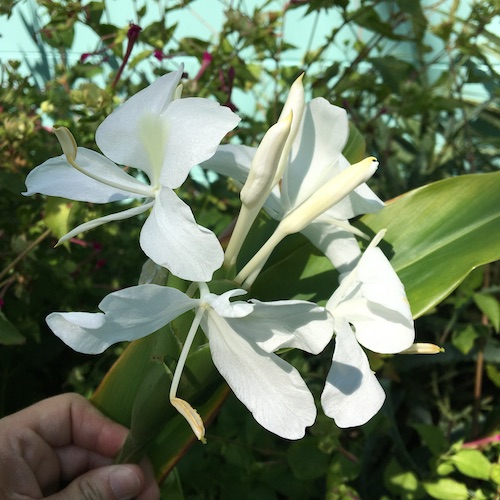
When we care for something, we engage in a feedback loop that the more we care and nurture, the more capacity we have for increased caring. Smith elaborates...
"The recovery of generous and caring feelings sets up a virtuous circle leading to hopefulness in place of anger and despair. This aspect of our psychology is the mind's counterpart to the cycle of life in nature, through which destruction and decay are followed by growth and renewal" (31).
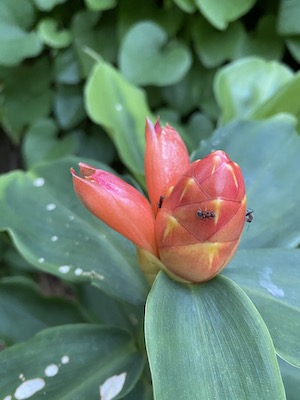
Wonder Wednesday 118: Growing Ginger!
"Plants are so much less challenging and intimidating than people and working with them can help us reconnect with our life-giving impulses" (31).
So to help encourage that connection in an era of history when connecting with people seems, shall we say, less than inviting for a plethora of reasons - let's all grow some ginger!
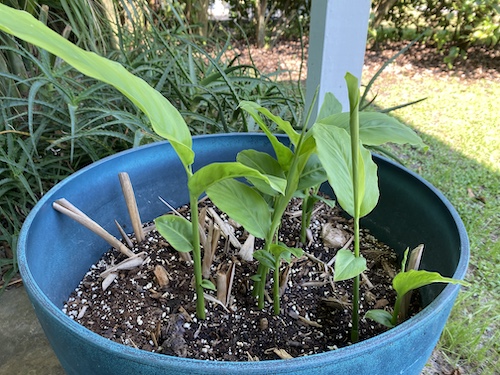
Spring is the best time to plant Ginger (aka Zingiber officinale). This delightful spice is easy and accessible to grow regardless of where you live.
It grows great indoors, or out, and is fun and easy for everyone to grow regardless of experience. So let's nurture ginger together and receive all the benefits she wants to give back too!
Materials
A flower pot.
I think a 12 inch pot is ideal for a 2-3 inch ginger root or 2 smaller pieces. I recommend terra cotta in humid climates because it breathes so well, or plastic in dry climates, but any pot with good drainage holes will do.
(You may decide to repot bigger later, or not.)
Potting soil.
A nice light potting soil, not planting soil that is for in the ground not pots. Yes, it makes a big difference. Ginger is a root, so the last thing we want is heavy soggy poorly draining soil because that = root rot!
If you have the option, choose a soil that is slightly more acidic at like a 6-6.5ph.
A piece of fresh ginger root.
Find this at a grocery store, flea market veggie stall, famers market, herbal nursery...
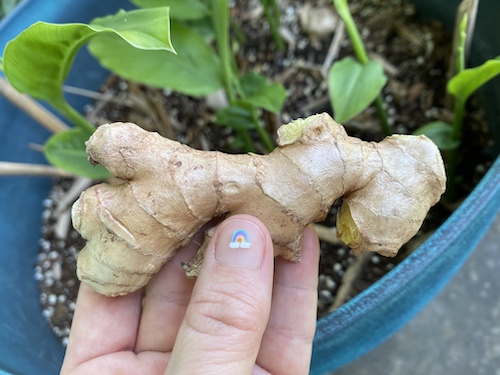
Preparation
Make sure your flower pot is clean if you are up-cycling one.
Pick your ginger root wisely - When choosing a fresh piece of root, look for roots that are fresh, plump, and firm -not dry and shriveled.
If the root has nodes (aka eyes) that look like they have a bit of growth beginning that is especially ideal, but not necessary.
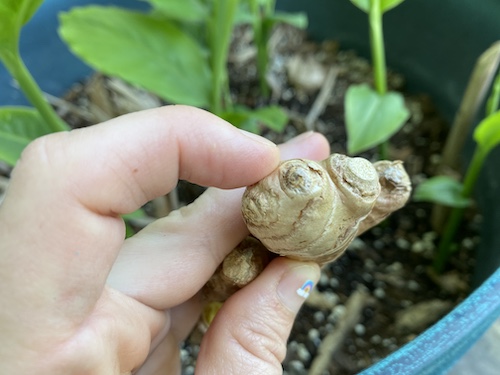
If you choose a larger root, you can cut it into 1.5 inch chunks to plant, but make sure each chunk has an "eye".
If you cut the root into chunks, leave them out over night to "harden off" before planting.
Plant Your Ginger & Nurture its Growth!
Plant your piece of ginger root 3 inches deep into your pot. If you are planting a couple chunks in a 12 inch pot, space them about 6 inches apart in the pot.
If your root is already sprouting, position the sprouts upwards. If not you can position the eyes upwards or sideways. If there are eyes on multiple sides don't worry, just pop that chunk in there and cover it up with soil.
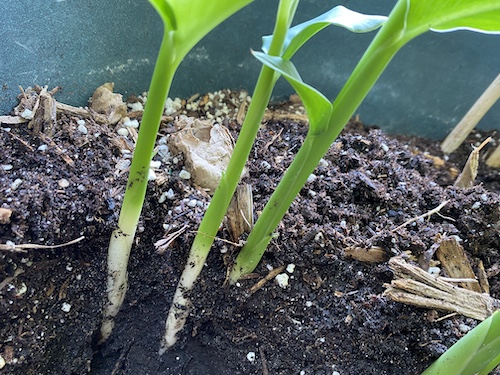
Ginger plants like bright indirect light and humidity. Indoors, place the pot where it will get no more than 5 hours of direct sun a day. An east or west window is great.
If outdoors, a northern exposure with morning or afternoon sun works great. Southern exposures can be a little intense for her.
If you live in a very dry or cold climate, you may want to place her in a bight bathroom or get a humidifier.
Water your potted roots after covering them.
Keep the soil moist but not wet.
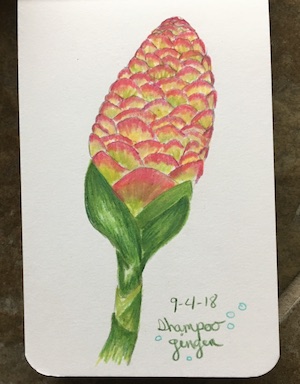
Ginger is native to India and flourishes in lush tropical places like Costa Rica and Hawaii, so try to avoid letting the soil dry out.
Water when the soil feels slightly damp.
The more time you spend with your ginger plant friend, the more you'll get a true understanding of her water needs. And do more research- There is so much great info on growing ginger out there awaiting you!
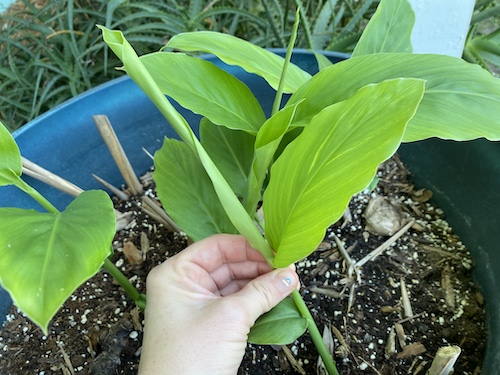
Ginger takes about 8-10 months before it's ready for harvest, so take time to get to know her!
Enjoy the growing process. Each day spend time nurturing your new friend ginger - even when she is still under the soil.
Talk to her roots and plant shoots, sing to her, read to her, become friends! She is a good listener.
Observe the beautiful leaves and their spicy aromatic fragrance. Research her needs and wants, and what you could make with her roots she'll soon offer you.

Feel free to feed her a little organic potted plant food (according to package instructions) once her shoots are about a foot high.
She is a tall one! Taller than me, see! So you may want to use a piece of bamboo or a yardstick as a stake if you think she needs some structure.
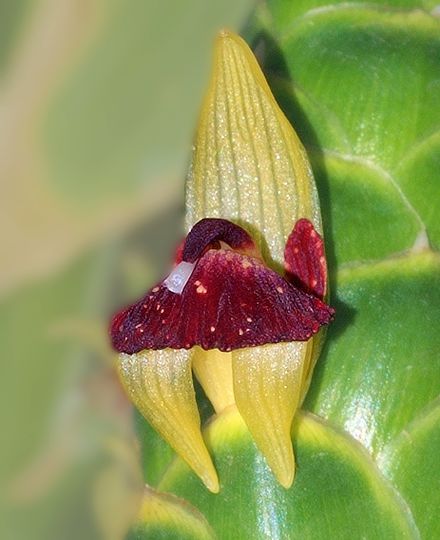
Some culinary ginger flowers, but not all. Mine hasn't but this is a photo of the potential! (credit)
You'll know she's ready for harvest when the green stems start to turn brown and die back. Ginger dies back to the root after the growing season.
You may miss your friend for now, but you can plant one of her new rhizomes and befriend her daughters and granddaughters in growing seasons to come!
Just cut back the stalks and dig up the rhizomes/roots that have multiplied while you were hanging out with her shoots!
(I don't recommend eating the original root planted. You can recognize the originals because they don't look lush and fresh like the new ones.
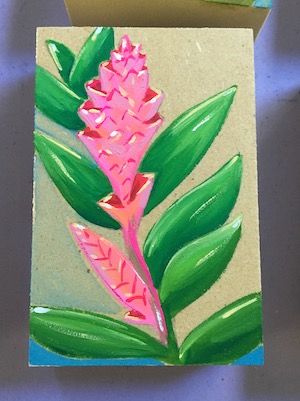
Scrub up the roots to remove all the soil from the nooks and crannies.
Then make tea, candy, and other delicious treats with the fresh roots your care helped to grow.
Celebrate the cycle of care and nurturing! You cared for your ginger plant and now she nurtures your body and mind in return <3.
**And ginger is a great plant to grow in multi-year classrooms because you plant in the spring and harvest before winter break!**
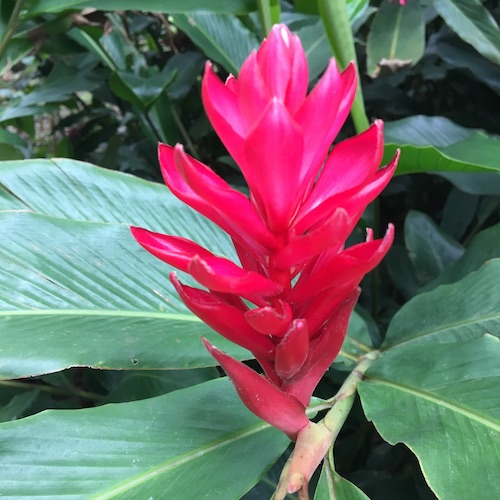
In a single word, how does nurturing growth make you feel?
Share your word in the comments below!
Share photos of what you love to grow on Instagram #wingswormsandwonder
Seeds to Sprout:
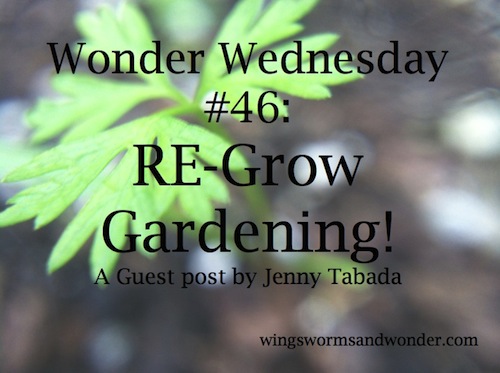
ReGrow Gardening
Psyched on unique gardening styles? Try reGrowing your grocery store produce! Learn how to grow a bunch of veggies in this Wonder Wednesday 46 project!
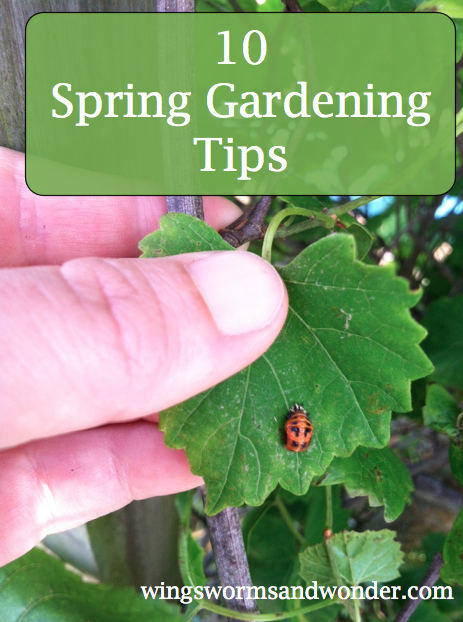
Spring Gardens
Have an outdoor garden? Want some extra tips & tricks? This post is for you!

Feedback Loops
Curious about how to cultivate more systems thinking & positive reinforcing feedback loops in life and relationships with nature? Check this out!
